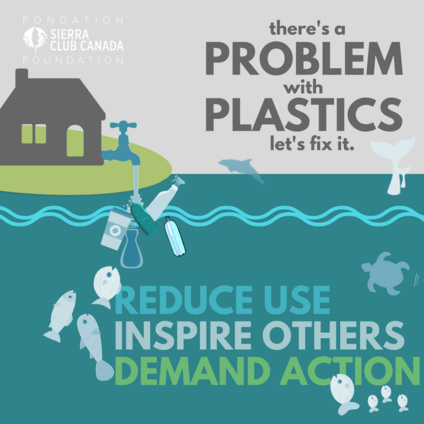
“I want to say one word to you. Just one word. Are you listening? Plastics.”
-- The Graduate, 1967
Plastics are convenient, affordable, and useful. They can be molded into furniture, shopping bags, and eyeglasses. Modern cars are more than 50% plastic, and plastic fibres are woven together to create nylon and other synthetic textiles. This is why Dustin Hoffman's character in The Graduate receives advice to pursue a career in them, to jump on the opportunities this magic material affords our contemporary society.
The same chemical features that make plastics so versatile also render them a growing threat to human and ecosystem health. Plastics take too long to degrade. For example, a plastic soda bottle takes over 450 years to break down. They are also lipophilic, meaning they act like sponges and absorb chemicals they have been exposed to. This can include persistent organic pollutants, heavy metals, and other common toxic substances. They carry these toxins wherever they are discarded. If tossed into the ocean, they go wherever the current takes them. If thrown into a landfill, they sit, potentially leaching contaminants into the soil and perhaps into groundwater.
Their ubiquity means we have an abundance of plastic waste in landfills, waterways, and roadside ditches. A global assessment of plastic production reveals that we have created 8.3 billion tonnes of plastic since it was invented, equivalent to over half a billion garbage truckloads.
About 75% of this, 6.3 billion tonnes, is now waste. While a small portion of plastic does get recycled, most single-use items such as drinking straws or water bottles end up in landfills or discarded in the environment.
The sheer volume of plastic means it is returning to us in ways big, small, and nano-sized. By 2050, the ocean will contain more plastic than fish. Discarded waste has coalesced into five massive plastic gyres in the ocean, of which the Great Pacific Garbage Patch is the largest. Wildlife is being choked, poisoned, and entangled by plastic. The fish we eat and the water we drink – including, ironically, water in plastic bottles – is now contaminated with plastics.
The rising tide of plastics is motivating people around the world, including members of Sierra Club Canada Foundation, to address the problem. It is an issue in which we see ourselves reflected, in terms of personal choices, as well as our ability to enact solutions at almost every level.
April 22, 2018 was Earth Day. Canada’s Environment and Climate Change Minister Catherine McKenna used the opportunity of a beach clean-up on McNab’s Island in Halifax to ask Canadians what we think are the solutions to plastic pollution in Canada. This is a huge opportunity for action against what is largely a preventable problem.
We need to go beyond the feel-good triage of beach clean-ups and address plastic pollution at its source. We need a federal policy that incentivizes the reduction or elimination of plastic waste.
The Canadian Environmental Protection Act grants the federal government power to limit or ban the release of pollutants into the environment. Federal government can also create industry standards that would reduce the release of plastic fibres into waterways from textiles and other goods. Provincial governments can create plastic reduction targets and incentivize better management, be it via recycling, bottle deposit-return programs, or other means. Municipalities have the power to enact bans on the use of plastic products, as Victoria, BC has done. Businesses and affiliated organizations can step up and stop using single-use plastics, such as take-out containers.
There is a huge groundswell across the world to deal with plastic pollution. The first step is getting active – pushing for the many solutions that are at our fingertips to resolve this problem.
Sierra Club Canada Foundation is seeking your support for our campaign to develop and implement robust policies aimed at replacing, reducing, reusing, and recycling plastics. We have developed a national Plastics Group for which are developing tools to further our fight against plastic. Please join the campaign today and sign on to take action.
With our thanks!
By Becky Bassick, Gretchen Fitzgerald, Mohan Basnet, and Lino Grima
